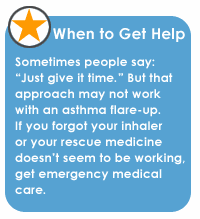How to Avoid the ER if You Have Asthma
Article Translations: (Spanish)
Going to the emergency room is the last resort for someone who has asthma. If a flare-up is really out of hand — and your medicine isn't working or you forgot your inhaler — you need to get emergency care for your breathing trouble.
The good news is that you can prevent emergency room visits if you take steps to get your asthma under control. Read on to find out how you can manage your asthma and avoid the ER.

Planning Ahead
Make a plan. Work with your doctor to create a personalized plan for managing your asthma (also called an asthma action plan). This plan should be realistic and should fit into your daily life. Your plan should outline your day-to-day treatment, give you symptoms to watch out for, and provide you with step-by-step instructions on what to do when you're having a flare-up.
Take charge. Once you have a plan, use it to take control. Put any daily requirements the plan calls for — such as taking medications before exercising — into your schedule so you don't forget to do these. Keep a copy of your plan with you so you'll know what to do if you have a flare-up. And don't be afraid to talk to your doctor if you find your plan isn't working for you. He or she can adjust your plan so it's more effective.
Avoid triggers. Your doctor should be able to help you figure out the triggers that can lead you to have an asthma flare-up. These may include tobacco smoke, animals, dust mites, dust, mold, pollen, perfumes, weather change, cold air, exercise, and respiratory infections. Once you know what your triggers are, you can try to steer clear of them.
Take your long-term control medicine. Long-term control medicines (also called controller or maintenance medicines) work over a long period of time to prevent flare-ups. Depending on how serious your asthma is, you may have to take long-term control medicine every day, even if you feel great. It's tempting to skip daily control medicines — lots of people fall into the trap of thinking they can just use quick-relief medicine when they have a flare-up. But doing this actually makes it more likely you'll have a flare-up and that it will be more severe.
Have your inhaler with you. Quick-relief medicine (also called rescue or fast-acting medicine) can help you during a flare-up, so don't leave home without it. Many ER visits for asthma happen because the person forgot his or her inhaler. This means making arrangements to have it at school, at sports meets, and when you are traveling.
Know the early signs of a flare-up. Everyone's asthma is different. Some people cough only at night, and others might have flare-ups whenever they get a cold or exercise outside. Get to know your asthma triggers and pay attention to what happens before you have a flare-up so that you know the early warning signs. These signs may not mean for sure that a flare-up will happen, but they can help you to plan ahead.
Peak Flow Meters
A peak flow meter can be a really useful tool in helping to determine if you might be getting ready for a flare-up. Your doctor can tell you which number ranges to watch out for.
Other early warning signs of a flare-up may include:
- wheezing
- coughing, even if you don't have a cold or a persistent cough
- tightness in your chest
- becoming short of breath easily with activities
- throat clearing
- rapid or irregular breathing
- inability to stand or sit still
- unusual fatigue
- restless sleep
Your asthma action plan should tell you how to handle early signs of a flare-up. This may mean using your quick-relief medicine or adjusting your long-term control meds slightly.
Flare-ups do happen, of course. An important part of staying away from the ER or your doctor's office is calmly and carefully following your asthma action plan when you do have a flare-up. Most flare-ups, when treated as your doctor tells you to, will go away quickly and not require a visit to the ER.
Signs You May Need to Go to the ER
Even if you do your best, you may still get the occasional flare-up. Don't be embarrassed to get emergency help if you think you need it.
Here are some situations that call for emergency care:
- You take your asthma medicine and your flare-up doesn't get any better.
- You feel a little better after taking your medicine, but your symptoms come back quickly.
- Frequent wheezing, persistent cough, or chest pain.
- You see that your lips and fingernails are bluish or grayish.
- You have trouble breathing, talking, or walking.
If you feel comfortable doing so, you might want to let your friends know about your asthma. Then they can help you if you ever have a severe flare-up.
Although asthma can be dangerous, when it's well managed it's rarely life threatening. Studies show that on the rare occasions when people have died from asthma, it's usually because they haven't taken their medications as prescribed and they have a history of repeated severe asthma flare-ups and emergency care.
If you take your asthma seriously and work to manage it, you may never need to go to the emergency room.
Note: All information is for educational purposes only. For specific medical advice, diagnoses, and treatment, consult your doctor.
© 1995-2024 KidsHealth ® All rights reserved. Images provided by iStock, Getty Images, Corbis, Veer, Science Photo Library, Science Source Images, Shutterstock, and Clipart.com

